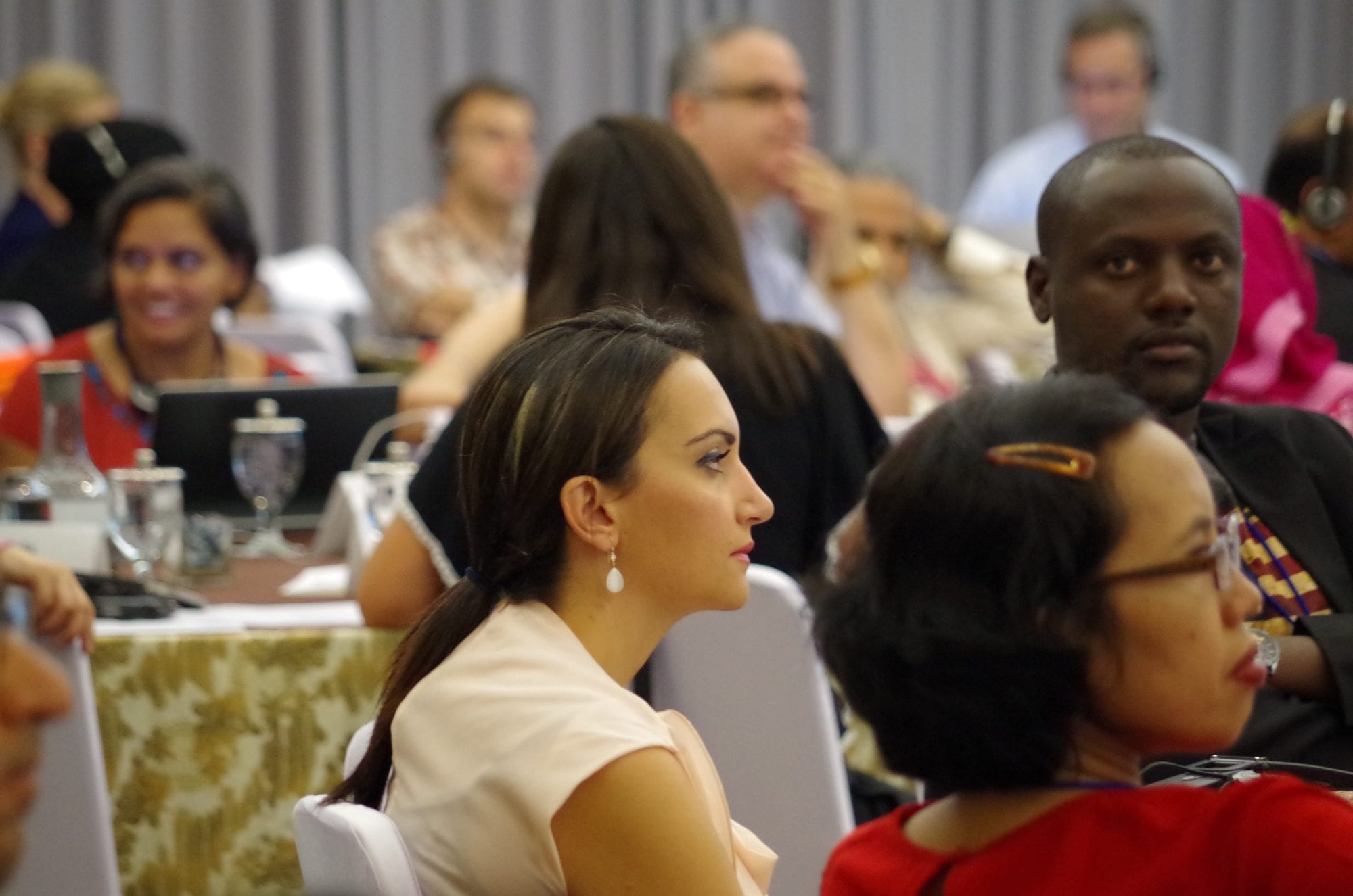
Aug 10, 2015
With 247 million migrants around the world, the vast majority of whom are migrating for labor, “migration is the defining issue of our time,” says Sabina Dewan, president and executive director of JustJobs Network.
“We need to talk about just jobs…so workers who want to migrate, migrate because of choice, not compulsion,” says Dewan, who opened the second morning session of Labor Migration: Who Benefits? A Solidarity Center Conference on Worker Rights & Shared Prosperity this morning in Bogor, Indonesia.
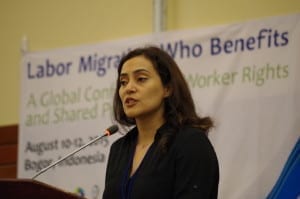
“We need to talk about just jobs…so workers who want to migrate, migrate because of choice, not compulsion,” –Sabina Dewan, president and executive director of JustJobs Network. Credit: Solidarity Center/Kate Conradt
Dewan pointed out that migrant workers will send $500 billion to developing countries this year, which is more than three times the official development assistance these countries will receive, and half of the funding they receive in direct foreign investment.
“This is what is driving governments to think about migration as a development strategy,” she says. But governments are confusing migration remittances for poverty reduction with development.
“Legal migration is to benefit all—the country of destination, the country of origin and the migrants themselves,” says Nicola Piper, speaking with Dewan on the plenary panel, “Toward a Shared Prosperity Agenda.”
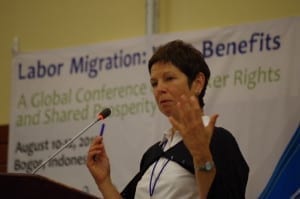
“More resources are being poured into border control rather than labor inspection”–Nicola Piper, professor at the University of Sydney in Australia. Credit: Solidarity Center/Kate Conradt
“Far more (state) resources are being poured into border control rather than labor inspection,” says Piper, who is a professor at the University of Sydney and the vice president of Global Migration Policy Associations in Australia. While paying lip service to human rights, states are focusing on controlling migration and extracting money from the migration process.
Right now, says Piper, the key beneficiaries “end up being labor recruiters and employers.”
Opening access to justice for migrant workers and changing the development paradigm to ensure migrant workers take part in shared prosperity is key to the discussions which more than 200 conference participants will engage in as they discuss strategies on organizing migrant workers, reforming the labor recruitment process and ensuring migrant worker access to justice.
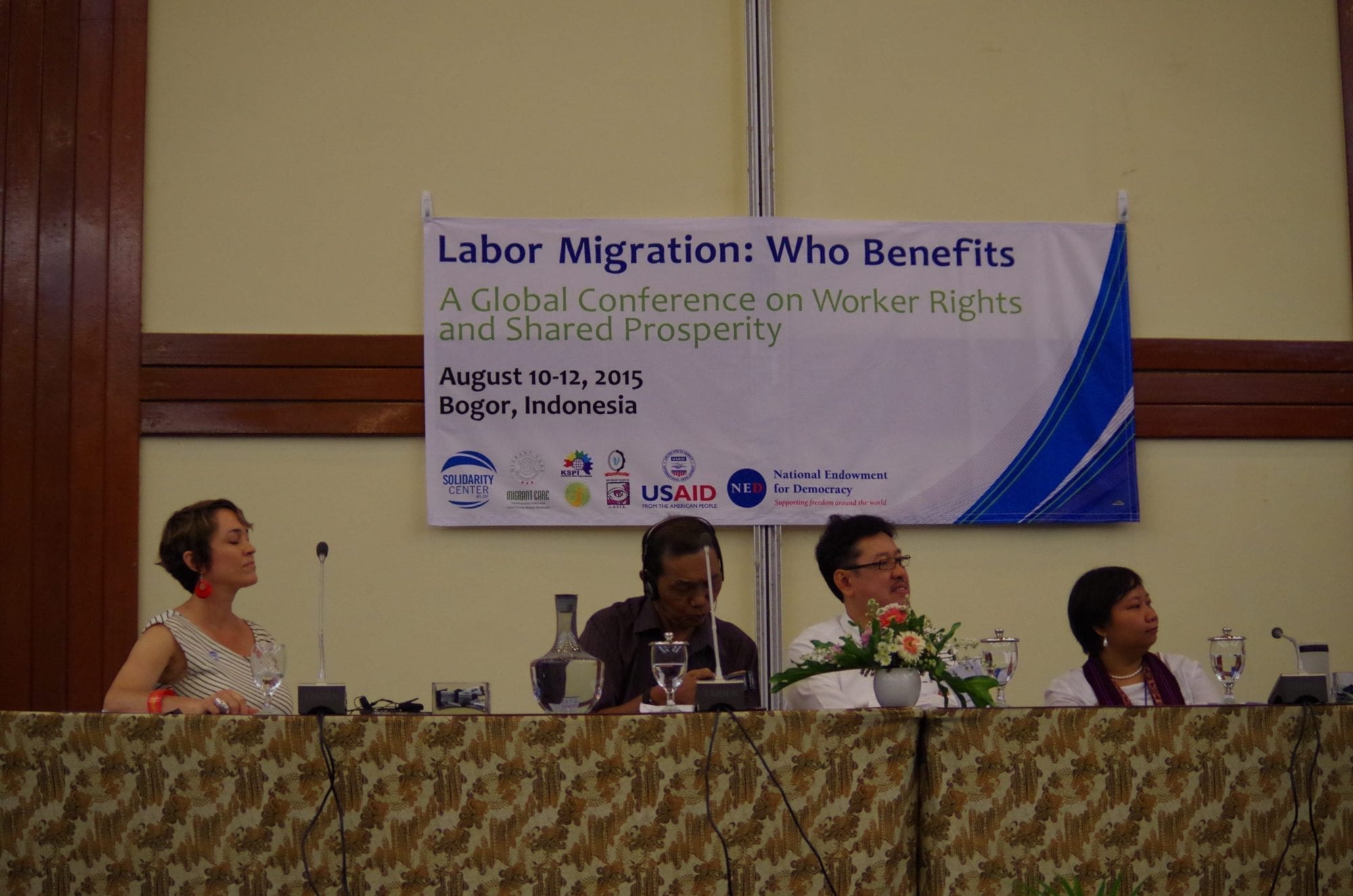
Aug 10, 2015
Saying that “labor migration takes place in an economic context of massive and growing global economic inequality,” Shawna Bader-Blau, Solidarity Center executive director, helped set the stage for the first day of the August 10–12 event, Labor Migration: Who Benefits? A Solidarity Center Conference on Worker Rights & Shared Prosperity.
“Systems that regulate labor migration do so to the detriment of equitable development and shared prosperity and even contribute to rising inequality—rather than relieve it,” Bader-Blau said. (Read Bader-Blau’s full speech.)

Solidarity Center Executive Director Shawna Bader-Blau spoke at the opening session of Labor Migration: Who Benefits? Credit: Solidarity Center/Kate Conradt
Meeting in Bogor, Indonesia, more than 200 conference participants from 45 countries are discussing strategies on organizing migrant workers, reforming the labor recruitment process and ensuring migrant worker access to justice. Neha Misra, Solidarity Center senior specialist for migration and human trafficking, welcomed participants to the three-day conference.
Anis Hidayah, Migrant Care executive director, pointed to an often overlooked aspect driving labor migration—the feminization of poverty. “Migration is full of women issues,” says Hidayah, many involving gender-based violence, especially for domestic workers, the vast majority of whom are women. Based in Indonesia, Migrant Care is co-sponsoring the conference with the Solidarity Center.
In Indonesia, 53 percent or more of Indonesian migrant workers are women and most are domestic workers, who are “vulnerable to gender-based violence,” Hidayah said.
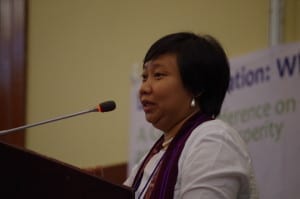
Most domestic workers are migrant workers, and many are “vulnerable to gender-based violence.”–Anis Hidayah, executive director, Migrant Care
She pointed out that Bogor, where participants are meeting, is the location of many labor recruitment agencies “that send migrant workers without protection of their rights.”
Also opening the morning plenary, Harry Sudamanto, representative of Indonesia’s Ministry of Manpower and Transmgration, said that the government “has the obligation to deliver the protection for all the migrant workers overseas,” starting from their departure through employment until they return to Indonesia.
Sofyan Abdul Latief, vice president Konfederasi Serikat Pekerja Indonesia (KSPI), discussed how the union provides services to migrants before departure, especially with document preparation. Labor brokers often do not list correct addresses or ages of migrant workers, and so “when a problem happens abroad, it is really difficult to track a person.”
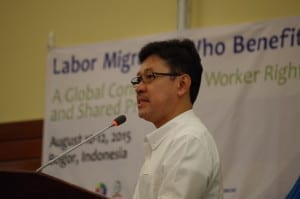
Harry Sudamanto, representative of the Indonesian Ministry of Manpower and Transmigration, said the government has the obligation to protect migrant workers from the time they leave to the time they return. Credit: Solidarity Center/Kate Conradt
“They don’t know if they will be placed at the right job they will be promised. They never know.”
The truth is, says Bader-Blau, “we are actually living with temporary migration system perfectly designed to reflect the economic value of profit over people, and the political choice to create a hierarchy of rights—in this case, worker rights—that serves that economic interest.
“It’s a system in which low wage men’s labor is expendable, and deeply undervalues women’s work. And I would go one step further and say there is nothing at all market driven about this phenomenon. It’s interest based—elite interest based, and deeply political.”
Bader-Blau urged participants to “take a page out of Indonesia” in moving forward with an agenda that empowers migrant workers.
“Nearly 20 years ago the Indonesian people, led by labor unions and student groups, took a risk and dreamt of something bigger and something better and they changed the face of their nation. Everyone we need to dream up a global civil rights movement for shared prosperity, is right here in this room—let’s make it happen.”
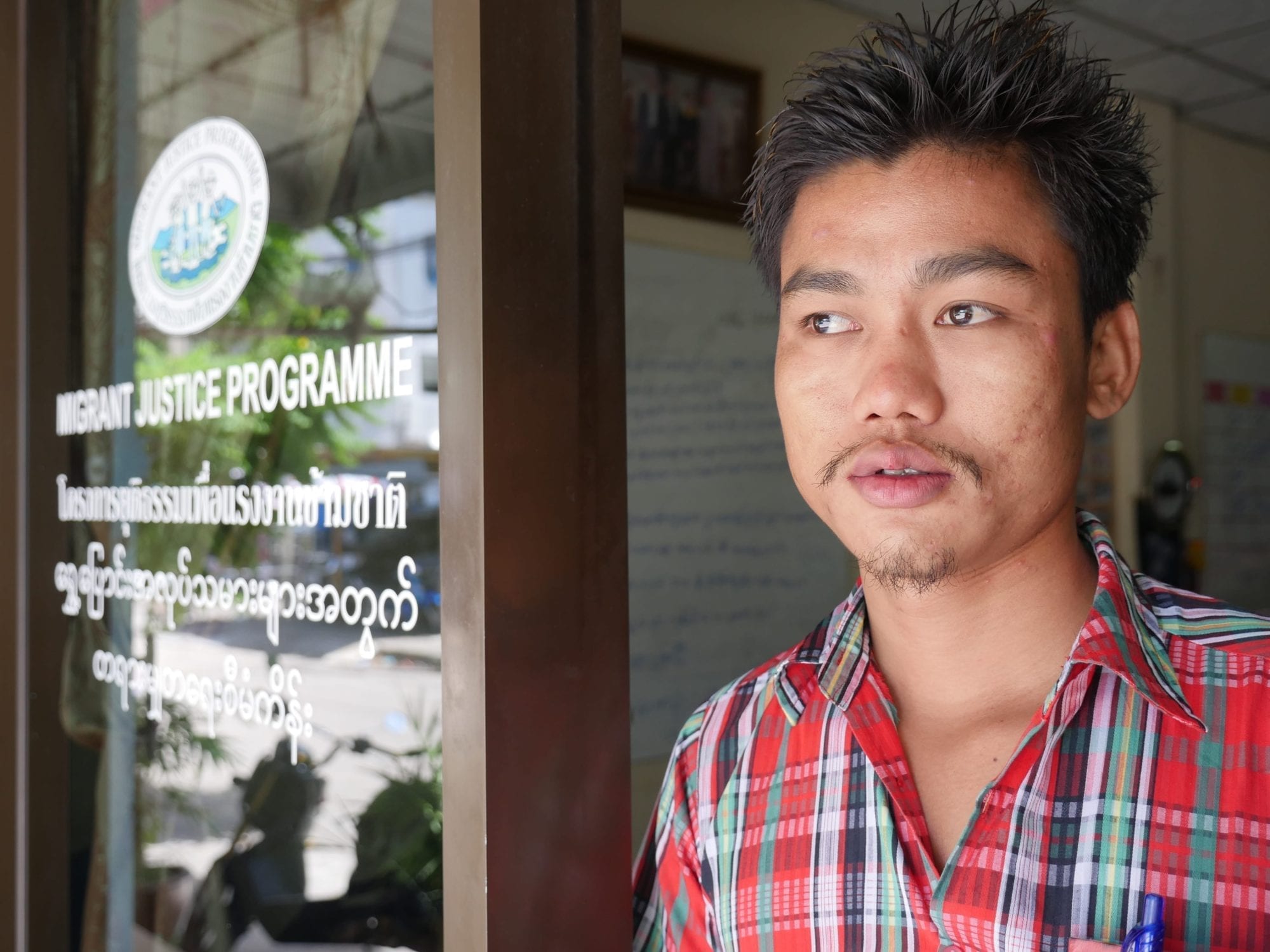
Aug 9, 2015
Human rights lawyer Preeda Tongcumnum is among the more than 200 migrant worker advocates gathering in Bogar, Indonesia, this week to take part in the Solidarity Center labor migration conference. As assistant to the secretary general at the Human Rights and Development Foundation (HRDF), Tongcumnum helps migrant workers in Thailand understand their legal rights and advocates for policies that support migrant workers.
Another conference participant, Jane Barrett, affiliate support coordinator at the Congress of South African Trade Unions (COSATU), heads up a network of unions and worker associations that coordinate organizing and support for informal economy workers, including migrant workers. Barrett plans to “share some of our fledgling attempts and thinking around organizing migrant workers and to learn from other successful examples.”
Traveling from the United States, where he organizes a largely migrant workforce, Pablo Alvarado, executive director of the National Day Labor Organizing Network (NDLON), also is joining the August 10–12 event, Labor Migration: Who Benefits? A Solidarity Center Conference on Worker Rights & Shared Prosperity.
Tongcumnum, Barrett and Alvarado offer a glimpse of the broad range of migrant worker activists who are bringing their diverse experiences, challenges and successes together for three days to achieve one goal: empowering migrant workers.
They will share strategies on organizing migrant workers, reforming the labor recruitment process and ensuring migrant worker access to justice.
They will address xenophobia and gender equality, and they will take time to celebrate their victories: Members of the International Domestic Workers Federation (IDWF) will mark achievements like the 2011 passage of an International Labor Organization convention stipulating rights of domestic workers, many who are migrants, and the formation of the organization which unites domestic workers from around the world.
Get facts about migrant workers and follow the events on our website and on Twitter @SolidarityCntr.
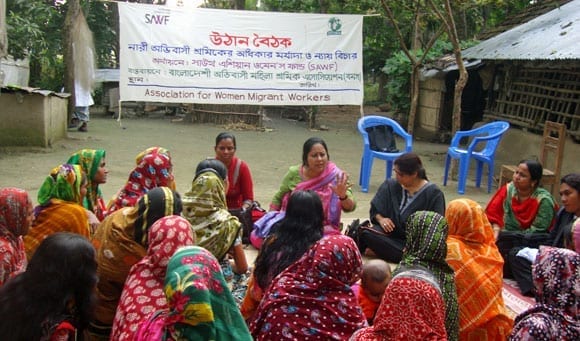
Aug 5, 2015
Ishor, 24, migrated from Nepal to Malaysia last November to work for a company at Johor Bahru’s busy commercial shipping port. What he did not know before he arrived is that the job involved working 16-hour days and being physically abused and harassed by his employer. Like most migrant workers, Ishor likely paid a labor broker a large amount of money to secure the job.
“Agents usually give (migrant workers) a very beautiful picture about the conditions in which they are going to work,” says Karuppiah Somasundram, assistant secretary of education of the Malaysia Trades Union Congress (MTUC). “Usually (migrant workers) don’t get a clear picture about how the work is going to be in Malaysia.”
Unscrupulous private recruitment agencies, prevalent in the labor migration process, offer workers non-existent jobs; misrepresent working conditions and compensation; confiscate crucial documents, like workers’ passports and visas; and impose excessive and illegal fees, according to labor and migrant rights groups around the world.
Solidarity Center Conference Explores Labor Recruitment
Strategies for reforming the labor recruitment process is one of the key topics at the upcoming Solidarity Center conference on labor migration in Bogor, Indonesia. From August 10–12, more than 200 migrant worker rights experts will also discuss migrant worker access to justice, xenophobia and organizing migrant workers.
While Malaysia is a destination country for many migrants seeking work, Bangladesh sees more than 600,000 workers a year who leave for jobs, making it one of the largest countries of origin for migrant workers.
Bangladeshi workers who migrate “are suffering, they are crying, they are not getting food,” says Sumaiya Islam, director of the Bangladesh Migrant Women’s Organization (BOMSA). “After two years, after three years, they are not getting their salary. After spending $1,000 (to labor recruiters), they are not getting paid.”
BOMSA holds “courtyard meetings” in villages around the country, helping women understand their rights before they migrate—including what they should demand of labor brokers and the wage and working conditions at the homes in Gulf and Asian countries where they will be employed as domestic workers. Simultaneously, BOMSA has been working to change national level policies to ensure that employers, not workers, pay recruitment fees.
The next step, Sumaiya says, is to educate employers in destination countries, “especially women, about the rights of domestic workers.”
Migrant Workers Need Jobs, Countries Need Workers
“Most Malaysians cannot take breakfast without migrants,” says Karuppiah. “You go to hotel, it’s a migrant; a car wash, it’s a migrant. At minimum, they work 12 hours or 14 hours a day. In Malaysia, (employers) give them one day rest day a month.”
On the other side of the migration spectrum, Sumaiya describes the factors pushing Bangladeshis far from their homes.
“I was in training center and I was talking with workers about why are you going,” she says. “Some say we need more money, more than 60 percent say we like to change our life because our husband is getting married again, some (husbands) are beating us, some (husbands) are drug addicts, some (husbands) are not giving us money for our family life. Most of them are saying they are supporting their family, Most of them cannot sign even their name, so they say ‘I have to go overseas so I can earn money.’”
Those working on behalf of migrant workers like Karuppiah and Sumaiya, believe that the majority of the world’s 247 million migrants who migrate for jobs will continue to do so. Their job is to make the process fair for workers, from their first contact with a labor broker to the day they return their families at home.
Karuppiah and Sumaiya will discuss their strategies next week at Labor Migration: Who Benefits? A Solidarity Center Global Conference on Worker Rights and Shared Prosperity.
Follow at Labor Migration: Who Benefits? at the Solidarity Center website and on Twitter @SolidarityCntr.
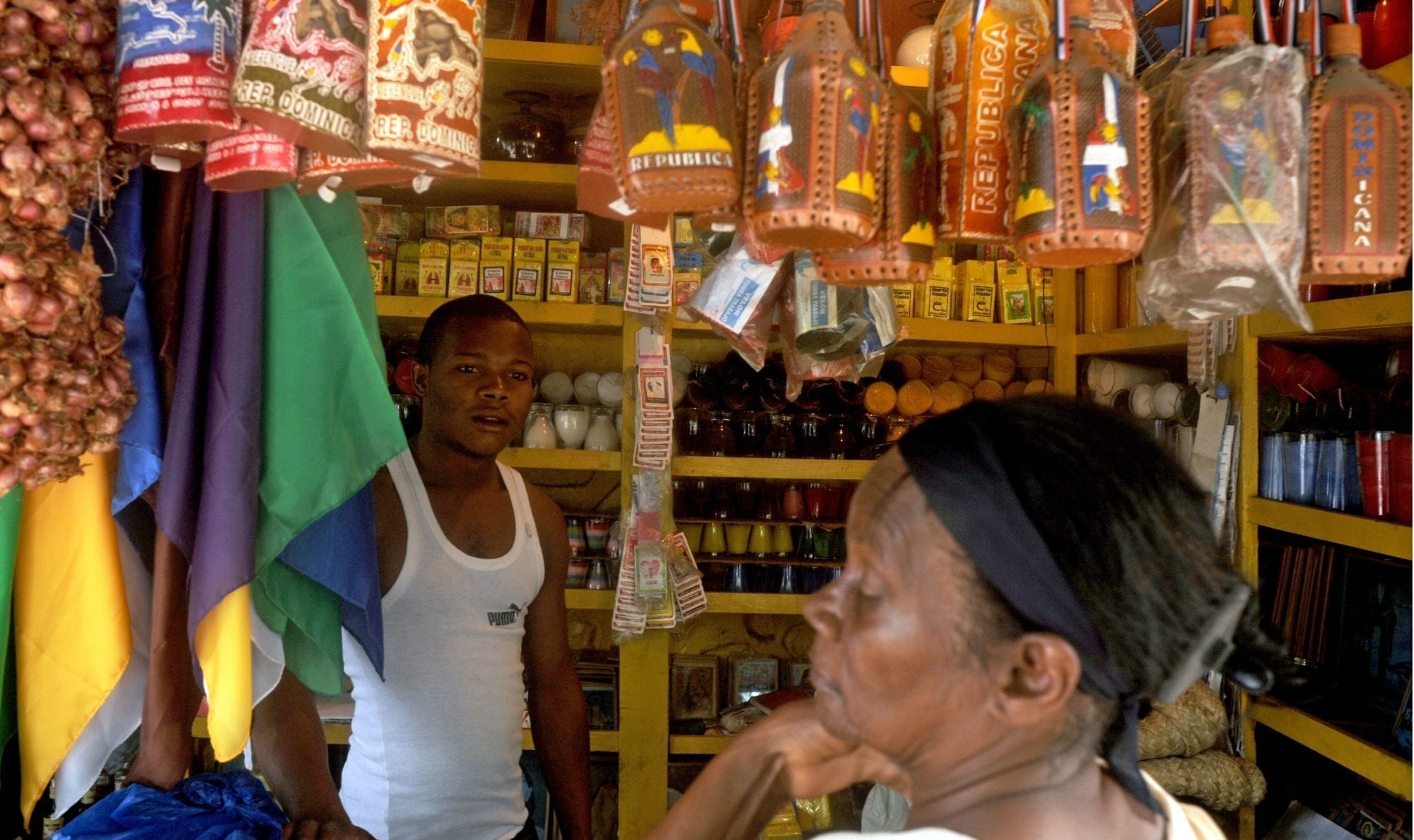
Aug 4, 2015
More than 300,000 domestic workers in Hong Kong, Special Administrative Region of China have migrated from the Philippines, Indonesia and other Southeast Asian countries seeking jobs to support their families. Recent high-profile instances of employer abuse against these domestic workers—unpaid wages, 24/7 working hours, and even physical assault—offer a glimpse into the migrant crisis that recently has focused the world’s attention on longstanding issues of debt bondage, human trafficking and mistreatment of workers striving to earn a decent living in the region.
But when they face an abusive work situation in Hong Kong, SAR, migrant domestic workers—nearly all of whom are women—have an opportunity for strong support through the Federation of Asian Domestic Workers Union (FADWU).
“We help them file a case with the Labor Department because, as a union, we can have the right of representation in a tribunal,” says Leo Tang, organizing secretary for the Hong Kong Confederation of Trade Unions (HKCTU), which includes FADWU as an affiliate. “Sometimes we provide shelter to those in need.”
Solidarity Center Labor Migration Conference
Tang is among more than 200 migrant worker rights experts taking part in the Solidarity Center’s Labor Migration conference in Indonesia, August 10–12. Conference participants will strategize within themes that focus on labor recruitment reform; organizing; and migrant worker access to justice.
Assisting workers first requires reaching out to them before they need support. That’s why organizing domestic workers is fundamental for the five unions that comprise FADWU. Based on nationality, the unions provide a cultural meeting ground that extends to education and training about their rights on the job.
Tang now is taking the members to the next step: shaping an inclusive union. “We are trying to unite all nationalities, all the migrants, under the federation structure,” he says.
In Mexico, where 10 percent of domestic workers migrate from countries such as Honduras and Peru, the Center of Support and Training for Domestic Workers (CACEH), reaches out to these workers to educate them about their rights.
“They have no information,” says CACEH leader Marcelina Bautista. “Often what happens is that their employer starts to retain their salaries to pay back the air ticket cost (the employer) spent bringing them to Mexico,” she said, speaking through a translator. Bautista, who also serves as International Domestic Workers Federation (IDWF) regional coordinator for Latin America, also will share her insights at the Solidarity Center event, “Labor Migration: Who Benefits? A Global Conference on Worker Rights and Shared Prosperity
CACEH, which Bautista founded 15 years ago, now has an extensive word-of-mouth network that enables them to organize domestic workers. CACEH also provides education services and train-the- trainer workshops that further expand the organization’s connection with domestic workers.
Market Vendors Join Forces to Improve Their Lives
In the Dominican Republic, where 60 percent of the workforce labors in the informal economy, Pablo de los Santos, president of National Federation of Sellers and Market Workers, says organizing market sellers involves letting them know about the disadvantages they face as self-employed individuals.
“I tell them about the advantages they could have once they organize themselves: better working conditions, living conditions, better benefits, for themselves and their families,” he said, speaking through a translator. Up to 60 percent of informal workers in the Dominican Republic are migrant workers, primarily from Haiti.
The organization, which started out in 2007 with a pilot program and now has branches in all 32 states, has sufficient bargaining power that it convinced banks to give 1 percent loans to dozens of informal economy workers, an achievement individual sellers often unattainable. The federation also negotiated improved infrastructure in Santo Domingo’s bustling open markets, and is seeking more space for Haitian workers.
Like Santos, Bautista is looking forward to taking part in the Solidarity Center labor migration conference to improve the ability of her organization to help workers. “It is very important to learn from the experience of all the other domestic workers who work in migration, especially colleagues who work in Asia and the United States, because they have a lot of experience working with migrant workers,” she says.
Follow Labor Migration: Who Benefits? at the Solidarity Center website and on Twitter @SolidarityCntr.










